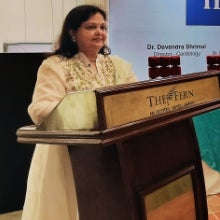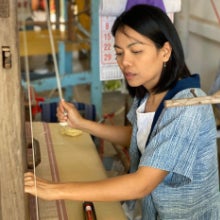Seven Asian women-led climate tech startups making a positive environmental impact
Date:
As the urgency for combating climate change is more critical than ever, women-led climate tech startups are emerging as agents of change in society and economy. They offer innovative solutions to address environmental challenges, demonstrating that gender diversity in leadership can catalyze meaningful progress toward a greener and more sustainable future.
This World Environment Day, we celebrate women who participated in the 2023 LowCarbon.Earth Accelerator Programme, a joint initiative by the Massive Earth Foundation in collaboration with the UN Environment Programme (UNEP). Supported by UNEP’s Global Opportunities for Sustainable Development Goals (GO4SDGs) project and the EmPower: Women for Climate-Resilient Societies Programme (EmPower), jointly implemented with UN Women, these startups are making a difference.
Seven startups were selected to join the LowCarbon.Earth Accelerator Finale in Bangkok, Thailand, from 25-26 April, where they got the opportunity to pitch their sustainable business ideas to investors.
INDIA
 Photo: Courtesy of Ankita Vijavergiya
Photo: Courtesy of Ankita VijavergiyaAnkita Vijavergiya
Billion Carbon Solutions
Ankita's startup, Billion Carbon Solutions, aims to tackle soil degradation by converting food waste into nutrient-rich fertilizer, effectively utilizing a resource that would otherwise go unused and contribute to greenhouse gas emissions.
INDIA
 Photo: Courtesy of Anshu Dandia
Photo: Courtesy of Anshu DandiaAnshu Dandia
Trinano technologies
Dr Anshu developed a light-trapping nano coating for solar panels that can be applied to new and already existing solar panels. The coating produced by Trinano technologies improves solar cell performance for increased energy output, boosting productivity by 10%. In addition, it helps minimize the cleaning requirement and extends the panels' life.
INDIA
 Photo: Courtesy of Swathi KJ
Photo: Courtesy of Swathi KJSwathi KJ
TechXEarthspace
Swathi and her husband built a technology to capture CO2 using liquid absorption and non-linear wave mechanics to convert it into Sodium Bicarbonate, which can be used in fertiliser, detergents, textiles and chemical industries. Their company, TechXEarthspace, is currently targeting the steel industry in India, working both at the point of source and through direct capture. They also provide carbon credits to offset emissions.
MONGOLIA

Photo: Courtesy of Oyungerel Munkhbat
Oyungerel Munkhbat
AIREE Felt
Oyungerel’s business, AIREE Felt, produces air filters from sheep wool. The company collaborates with herders who are vulnerable to climate change, creating value-added products that reduce wool waste and efficiently utilize the carbon sequestered in the wool.
SINGAPORE
 Photo: Courtesy of Lily Jaung
Photo: Courtesy of Lily JaungLily Jaung
Pullulo
By upcycling waste from leftover fruits and vegetables, Lily's startup, Pullulo, produces a microbial protein through a process that consumes carbon dioxide. This innovative solution not only reduces food waste but also offers a plant-based protein alternative, enhancing food security.
SINGAPORE
 Photo: Courtesy of Min-Si Wang
Photo: Courtesy of Min-Si WangMin-Si Wang
Ecomonitor
Ecomonitor is a carbon-sourcing platform for individuals and companies that want to issue voluntary carbon credit. With her business, Min-Si aims to lower the cost of carbon credit issuance and bring more transparency to voluntary carbon markets. One of her aims is to empower smaller project developers with under 200 acres of land.
THAILAND
 Photo: Courtesy of Vilasinee Churat
Photo: Courtesy of Vilasinee ChuratVilasinee Churat
MUNIE Lifestyle
MUNIE produces sustainable textiles made from water hyacinths, a naturally growing weed in waterbodies in Thailand. Founder Vilasinee works with elderly women in local communities in Northeast Thailand who handweave the textiles using traditional techniques.
From renewable energy sources and waste-to-energy technologies to digital carbon-sourcing platforms, these startups are driving innovations that reduce our carbon footprint.
EmPower supports women entrepreneurs and women-led micro-, small- and medium-sized renewable energy-based enterprises, including those from marginalized communities, in growing and scaling their innovative solutions for a sustainable future.
Through programmes like EmPower, UNEP and UN Women aim to create a world where clean, renewable energy is accessible to all, thereby reducing global dependence on fossil fuels and minimizing harmful impacts on the environment. By empowering women and marginalized communities, the programme fosters inclusive growth and ensure that the transition to a green economy benefits everyone.
The LowCarbon.Earth Accelerator Programme returns for its 4th edition, supporting climate tech startups in the Asia-Pacific region. Apply now: https://lowcarbon.earth/
Jointly implemented by UN Women and UNEP, with support from the Governments of Germany, New Zealand, Sweden and Switzerland, EmPower is dedicated to empowering women and marginalized groups to take the lead in building climate-resilient communities.
For more information, visit www.empowerforclimate.org